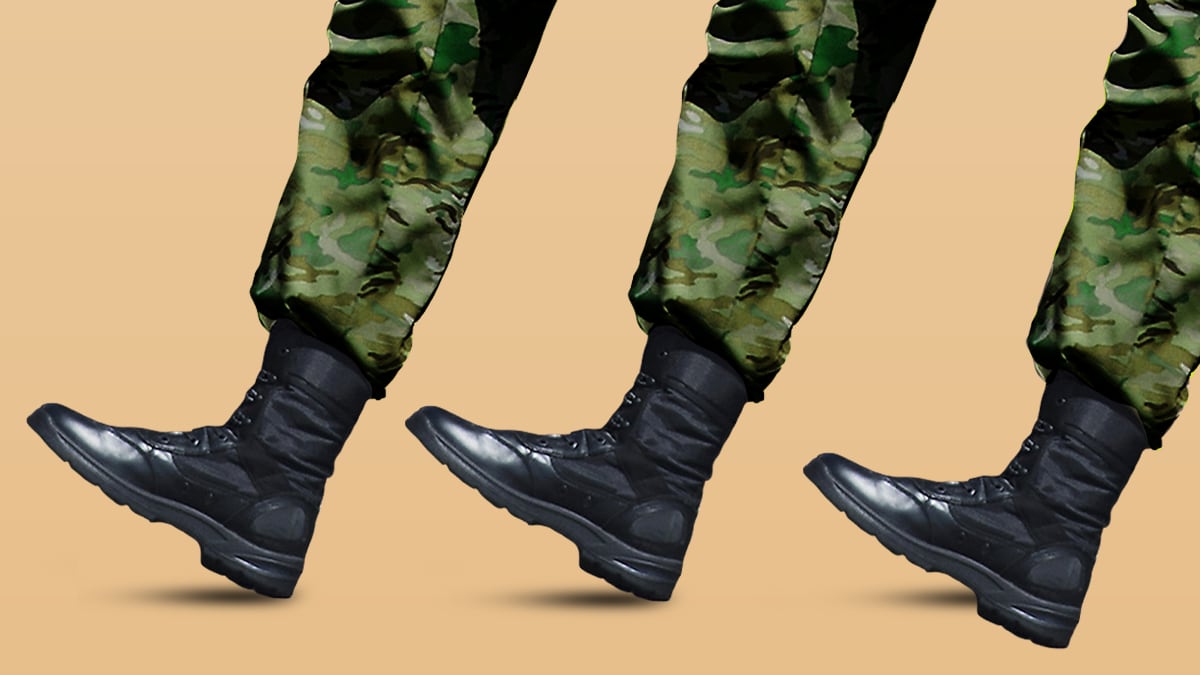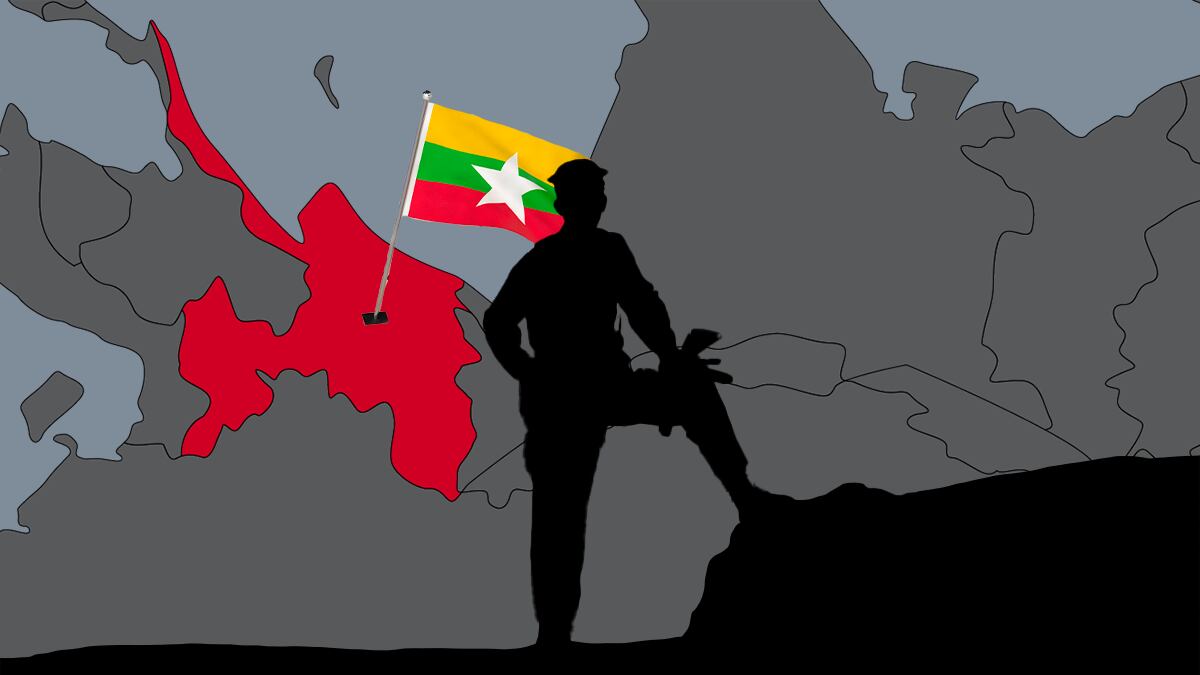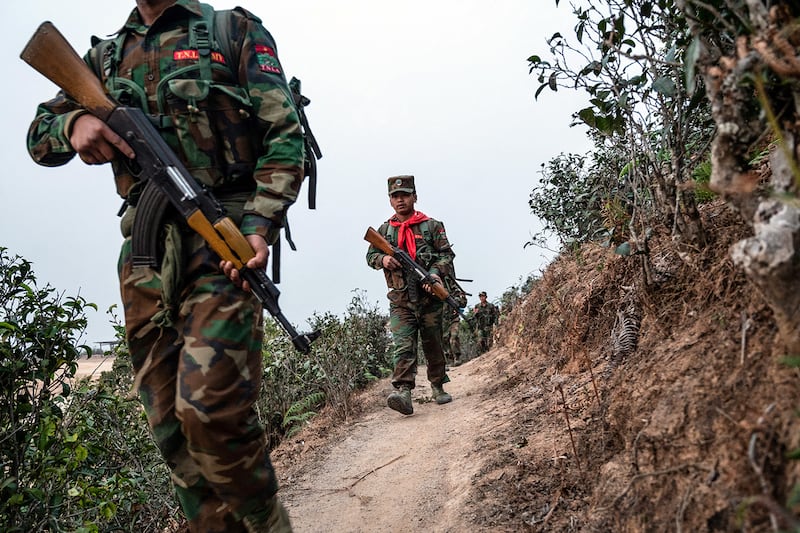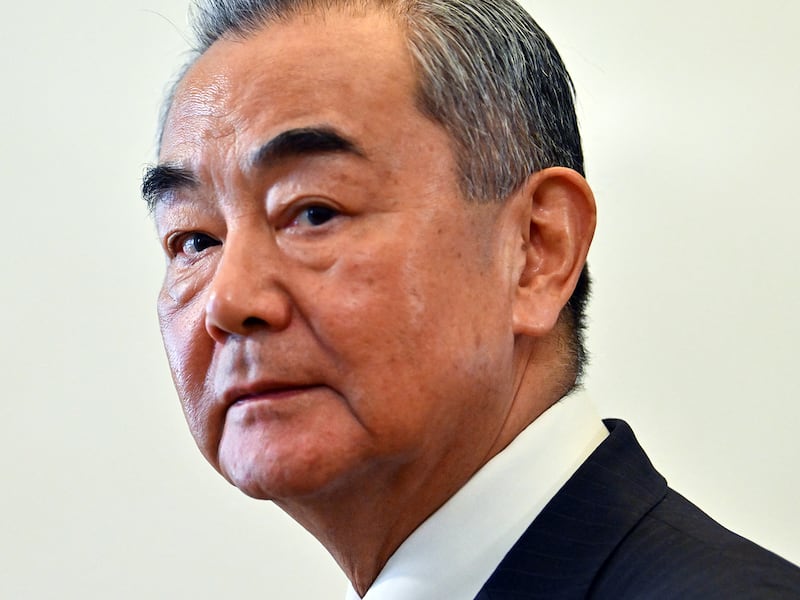What happens when China puts boots on the ground in Myanmar?
The move represents direct intervention by China, whose troops will have to conduct offensive operations.

It now appears to be a question of “when, not if” Chinese security personnel will arrive in Myanmar, with Beijing looking to secure its strategic interests in the war-torn country and those of its ally, the military junta that has lost large chunks of the country since the 2021 coup.
The Irrawaddy online news outlet reported that the junta formed a 13-member working committee on October 22 to prepare the groundwork to establish a “joint security company” with China.
According to the report, the committee, chaired by Major-General Toe Yi, the junta’s deputy home affairs minister, is currently tasked with “scrutinizing the importing and regulating of weapons and special equipment” until Beijing signs a drafted MOU on forming a “security company.”
After that, according to the narrative from Beijing and Naypyidaw, Chinese personnel would join a “company” — more like a militia — alongside junta troops, which would be tasked with defending Chinese strategic and economic interests in the country.
I’m told that China will send troops from the military and police in a “private” capacity, giving the fiction of detachment.
Yet this would not be a joint venture in anything but name.
Does one seriously think that Chinese troops or police are going to listen to the Myanmar generals who have lost battle after battle to ethnic armies and ill-trained civilian militias over the past four years?
Moreover, there is no reason to think that the China-junta “militia” will stick to merely protecting Chinese nationals and Chinese-owned businesses in Myanmar.
Chinese projects delayed
It is true that Chinese assets have come under increased levels of attack from anti-junta forces in recent months.
There is some logic, if you’re sitting in Beijing and Naypyidaw, in wanting to allow Chinese forces to help command most of northern Myanmar, giving junta forces a better chance of mopping up rebel forces elsewhere.
The civil war has delayed key Chinese projects in the country, such as the long-planned China-Myanmar Economic Corridor between China’s Yunnan province and Myanmar’s Indian Ocean coast.
Strategically key for Beijing is a port it wants to build in Rakhine state, allowing China to import oil and gas from the Middle East without ships needing to pass through the Malacca Strait, a potential chokepoint.
This would be essential in the event of a conflict in the South China Sea, during which the Philippines or Taiwan could try to blockade Chinese trade, including oil and gas imports on which China’s economy depends.
My sources say that the majority of the PLA contingent will be deployed to Rakhine state.
According to statements released by Beijing, almost certainly intended to construct a peace narrative ahead of the deployment, Chinese Foreign Minister Wang Yi told junta leader Min Aung Hlaing in August that he hoped “Myanmar will earnestly safeguard the safety of Chinese personnel and projects.”
When Min Aung Hlaing visited China earlier this month, his first visit since the coup, Chinese Premier Li Qiang instructed him to “take effective measures to ensure the safety of Chinese nationals, institutions, and projects in the country.”
The reality, as Beijing knows well, is that the junta cannot ensure these things.
That’s the entire reason why the “security companies” are deemed necessary by the Chinese government.
Offensive operations
Once Chinese security personnel are on the ground in Myanmar, the fiction that they’re just standing guard outside a few industrial compounds or pipelines will become difficult to maintain.
Indeed, they’re likely to have no choice but to mount offensive operations.
The most obvious reason to expect this is that many Chinese-run enterprises are in territory currently controlled by resistance groups that will presumably need to be taken by Chinese forces.
If not, why would Beijing make a u-turn on its existing policy, which had been to cajole and pay the ethnic militias to leave Chinese entities out of their fight with the junta?
Secondly, after years of dallying, Beijing now clearly thinks that it cannot trust the anti-junta National Unity Government (NUG), presumably because it’s too pro-Western, nor most of the anti-junta ethnic militias – even those who have taken money from Beijing.
Chinese authorities reportedly detained Peng Daxun, the leader of the Myanmar National Democratic Alliance Army (MNDAA), a militia that has inflicted heavy casualties on the junta, after he was summoned to Yunnan for a parlay last month.
This may be a temporary detention pour encourager les autres, or it may be Beijing trying to dismantle disloyal militias more permanently.
Yet, in essence, Beijing has now thrown its weight behind the junta because it presumably believes China’s interests would be best served by an outright junta victory.
So if Beijing thinks the ultimate way of protecting Chinese business interests in Myanmar, for now and in the long term, is for the civil war to be ended and for junta forces to win the conflict decisively, the difference between Chinese security personnel conducting defensive and offensive operations is paper thin.
Why wouldn’t Beijing use its troops to bring about its overarching goal? Why would Beijing overlook the opportunity to end a civil war that it wants over?
Anti-China sentiment
Why would Beijing merely send personnel to defend Chinese factories and pipelines for a few months or years if it thinks there is the possibility that forces hostile to Chinese interests could eventually take power nationally?
Under these circumstances, Chinese personnel would think it justified, under the narrative of “safeguarding the safety of Chinese nationals, institutions and projects in the country,” to wage offensive assaults against anti-junta forces across Myanmar.
Granted, the junta is touchy about being seen as a lackey of Beijing — or about Myanmar becoming a protectorate of China.
That is why Beijing has offered platitudes of a joint “security company,” a fiction to get around Myanmar’s constitution that forbids the deployment of foreign troops.
But what position will the junta be in to dictate what Chinese personnel can do or where they can go once they are in Myanmar?
Lastly, does one imagine that anti-junta forces won’t retaliate against Chinese intervention, especially when that intervention is so clearly on behalf of the regime?
Anti-China sentiment is running high in Myanmar and will boil over once Chinese troops and police step foot in the country.
One can very easily imagine an escalating campaign of attacks by anti-junta forces on Chinese interests – increasing the incentives for Chinese security personnel to launch offensive operations.
Once Chinese boots are on the ground in Myanmar, this means direct intervention by China – not merely an economic peacekeeping effort by joint “security companies.”
And Chinese personnel will have to conduct offensive operations – not just stand guard at Chinese-run factories and pipelines.
David Hutt is a research fellow at the Central European Institute of Asian Studies (CEIAS) and the Southeast Asia Columnist at the Diplomat. He writes the Watching Europe In Southeast Asia newsletter. The views expressed here are his own and do not reflect the position of RFA.
Are Chinese private armies entering the fray in Myanmar?
Deployment of PMCs demonstrates Chinese unease and junta desperation.

Between the high level visits of Chinese Foreign Minister Wang Yi to Naypyidaw and Myanmar junta leader Min Aung Hlaing’s trip to China, the neighbors struck one piece of business – a deal to allow the deployment of Chinese private military corporations (PMCs) to operate within Myanmar.
The BBC-Burmese Service, which first broke the story, reported that there are already four Chinese private security companies that are operating in Myanmar, doing static security work.
The deployment of mercenary forces is a telling sign of China’s unease and of the desperation of the State Administrative Council (SAC), as the junta is formally called.
China is obviously very concerned about the junta’s ability to protect Chinese interests in the war-torn country, but a deployment of private Chinese armies is nothing less than a complete humiliation for Min Aung Hlaing.
Despite the military’s bravado, over half of Myanmar is now in opposition hands, and junta forces have failed to retake most of the territory they have lost since the Three Brotherhood Alliance commenced Operation 1027 in October 2023.
The Chinese deployment is a stark admission on the part of the February 2021 coup leader that his forces are spread too thin. Despite the monthly induction of 5,000 conscripts, battlefield losses, and defections are cutting into the regime’s numerical advantage.
The Irrawaddy reported that on October 22, the junta established a 13-member working committee composed of the Ministry of Defense, Ministry of Home Affairs and other ministries to draft the memorandum of understanding on the military company’s establishment and import of weaponry and communications devices.
The committee would also determine where and how the Chinese PMC could be deployed.
Chinese PMCs
The new PMC has not been established, but chances are it would be a subsidiary of or a joint venture with one of China’s large existing PMCs, which have proliferated since the 1990s when a set of laws created the framework for their operation. Those laws were amended in 2009.
Today, there are roughly 20 Chinese PMCs operating in 40 countries, mostly in Africa, to provide security for Belt and Road Initiative projects.
RELATED STORIES
Myanmar’s Kachin insurgents take control of their border with China
Residents in Myanmar feel the crunch as trade with China shuts down
Myanmar’s Kachin rebels stop rare earth exports to China
The big players in the market are De Wei Security Group Ltd, Hua Xin China Security, Guan An Security Technology, China Overseas Security Group, and Frontier Services Group.
Chinese PMC do not have the same business model as Russia’s Wagner Group, which really is used more as an expeditionary fighting force that gives the Russian government a fig leaf of plausible deniability, in pursuit of the Kremlin’s broader foreign policy interests.
Wagner’s business model is also based on the extraction of natural resources. Chinese firms, to date, have operated more on a contractual basis and have focused much more on the protection of China’s economic interests under the Belt and Road Initiative.
The attempted mutiny by Wagner’s CEO, Yevgeny Prigozhin in June 2023 has probably shaped Chinese leadership thinking about PMCs, likely prompting the Communist Party and People’s Liberation Army to step up their controls.
The firewall between the PMCs and the People’s Liberation Army has always been thin. Much of the corporate leadership as well as rank and file came out of the PLA, People’s Armed Police, or other Chinese security ministries.
The regular targeting of Chinese citizens and economic interests along the China-Pakistan Economic Corridor by Baluchi militants may be prompting a rethink in how and when Chinese PMCs can use force, and what the rules of engagement are.
Legitimately concerned about Min Aung Hlaing and the military’s competence, Beijing will be pushing hard for robust rules of engagement, and the ability to conduct offensive operations around their key economic interests.
Major Chinese interests
China has a wide range of economic interests in Myanmar.
These include their special economic zone and proposed deep-water intermodal container port in Kyaukphyu, the Wanbao copper mines, hydro electric plants in Kachin and northern Shan states, oil and gas pipelines that extend to Kunming in southwestern China, and jade and rare earth mines in Kachin.
But almost all of those projects are in areas that have come under the control of the opposition National Unity Government and its people’s defense forces, or allied ethnic resistance organizations.
Indeed, 90% of Myanmar’s natural resources are outside junta control, or in contested spaces.
What does that mean for Chinese PMCs?
If they are deployed in contested areas, such as the mines in Mandalay, Magway, or Sagaing, will they be fighting alongside junta forces?
Or will they simply be defending China’s economic interest which would free up regime troops?
Will there be intelligence sharing and targeting information, or tactical-level embedded deployments?
Given the close relationship between Chinese PMCs and the PLA, one has to look at this as the de facto deployment of PLA forces into Myanmar.
The Burmese language Khit Thit Media reported that a deal to establish a Chinese PMC in Kyaukphyu was signed this month between Gen. Kyaw Shwe Htun, the chairman of the Kyaukphyu Special Economic Zone management sub-committee, and officials from the Chinese CITIC Group Company.
The Arakan Army has surrounded Kyaukphyu, where construction on a special economic zone and port has stalled, but has made no attempt to enter it.
Would Chinese PMCs be allowed to go outside the perimeter? Could they provide intelligence, signals intercepts or targeting information to junta forces?
Punishing the ethnic armies
It’s hard to imagine that the ethnic armies will allow the deployment of Chinese PMCs in their territory.
China has already made it clear that it is doubling down on the junta, while the opposition NUG and ethnic armies have repeatedly defied Beijing by continuing to fight the military regime and reject calls for nationwide elections under junta terms.
China has tried to punish the ethnic armies by shutting down border trade, which impacts the local communities that are dependent on the flow of commerce. They have shut down the internet and electric power for many border towns.
The Chinese are now taking their pressure campaign to the next level.
On Nov. 18, Myanmar-Now reported that the Chinese had placed the Myanmar National Democratic Alliance Army (MNDAA) commander, Peng Daxun, under house arrest after summoning him to Kunming for talks.
China later denied Peng was under house arrest, saying he was receiving medical treatment.
This major escalation – coupled with additional support for the junta, including weaponry and drones, and negotiations about the deployment of private armies – should leave no one guessing as to what China’s position on Myanmar is.
Zachary Abuza is a professor at the National War College in Washington and an adjunct at Georgetown University. The views expressed here are his own and do not reflect the position of the U.S. Department of Defense, the National War College, Georgetown University or Radio Free Asia.


No comments:
Post a Comment